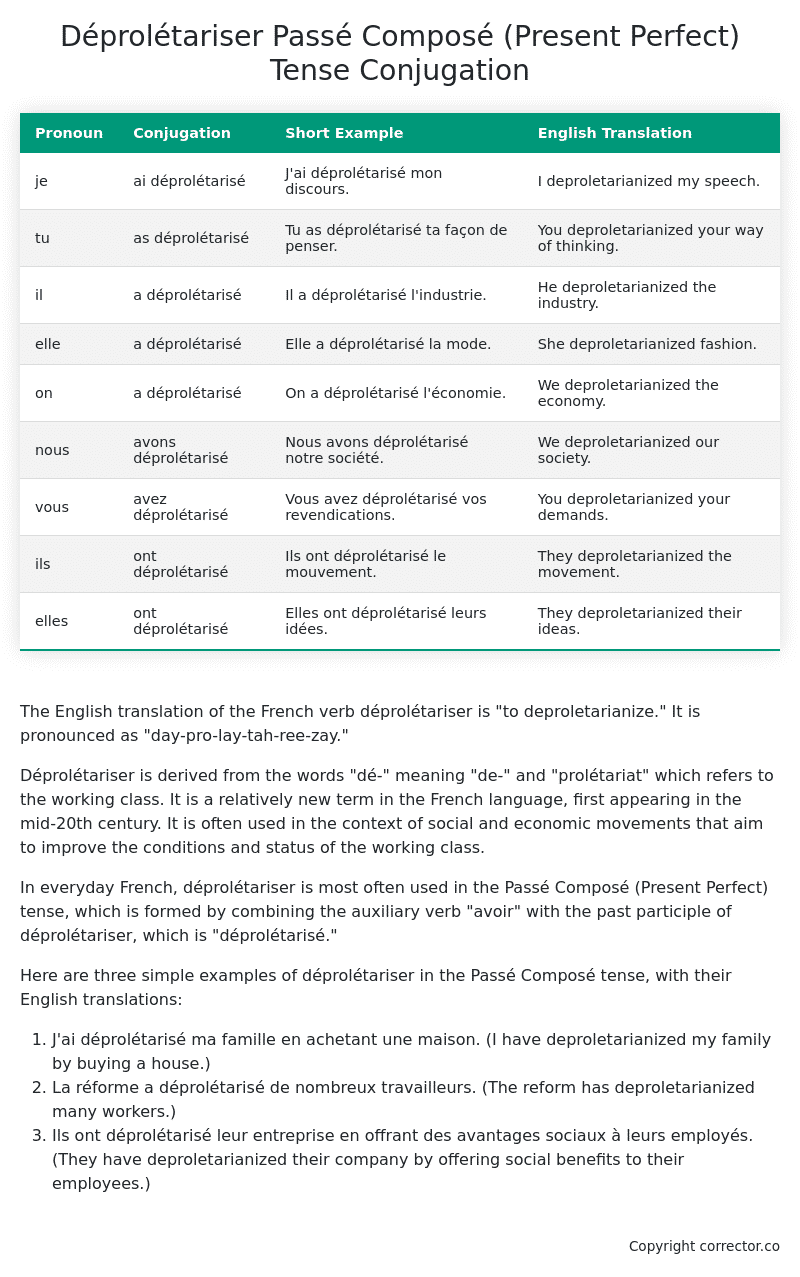Passé Composé (Present Perfect) Tense Conjugation of the French Verb déprolétariser
Introduction to the verb déprolétariser
The English translation of the French verb déprolétariser is “to deproletarianize.” It is pronounced as “day-pro-lay-tah-ree-zay.”
Déprolétariser is derived from the words “dé-” meaning “de-” and “prolétariat” which refers to the working class. It is a relatively new term in the French language, first appearing in the mid-20th century. It is often used in the context of social and economic movements that aim to improve the conditions and status of the working class.
In everyday French, déprolétariser is most often used in the Passé Composé (Present Perfect) tense, which is formed by combining the auxiliary verb “avoir” with the past participle of déprolétariser, which is “déprolétarisé.”
Here are three simple examples of déprolétariser in the Passé Composé tense, with their English translations:
- J’ai déprolétarisé ma famille en achetant une maison. (I have deproletarianized my family by buying a house.)
- La réforme a déprolétarisé de nombreux travailleurs. (The reform has deproletarianized many workers.)
- Ils ont déprolétarisé leur entreprise en offrant des avantages sociaux à leurs employés. (They have deproletarianized their company by offering social benefits to their employees.)
Table of the Passé Composé (Present Perfect) Tense Conjugation of déprolétariser
| Pronoun | Conjugation | Short Example | English Translation |
|---|---|---|---|
| je | ai déprolétarisé | J’ai déprolétarisé mon discours. | I deproletarianized my speech. |
| tu | as déprolétarisé | Tu as déprolétarisé ta façon de penser. | You deproletarianized your way of thinking. |
| il | a déprolétarisé | Il a déprolétarisé l’industrie. | He deproletarianized the industry. |
| elle | a déprolétarisé | Elle a déprolétarisé la mode. | She deproletarianized fashion. |
| on | a déprolétarisé | On a déprolétarisé l’économie. | We deproletarianized the economy. |
| nous | avons déprolétarisé | Nous avons déprolétarisé notre société. | We deproletarianized our society. |
| vous | avez déprolétarisé | Vous avez déprolétarisé vos revendications. | You deproletarianized your demands. |
| ils | ont déprolétarisé | Ils ont déprolétarisé le mouvement. | They deproletarianized the movement. |
| elles | ont déprolétarisé | Elles ont déprolétarisé leurs idées. | They deproletarianized their ideas. |
Other Conjugations for Déprolétariser.
Le Present (Present Tense) Conjugation of the French Verb déprolétariser
Imparfait (Imperfect) Tense Conjugation of the French Verb déprolétariser
Passé Simple (Simple Past) Tense Conjugation of the French Verb déprolétariser
Passé Composé (Present Perfect) Tense Conjugation of the French Verb déprolétariser (this article)
Futur Simple (Simple Future) Tense Conjugation of the French Verb déprolétariser
Futur Proche (Near Future) Tense Conjugation of the French Verb déprolétariser
Plus-que-parfait (Pluperfect) Tense Conjugation of the French Verb déprolétariser
Passé Antérieur (Past Anterior) Tense Conjugation of the French Verb déprolétariser
Futur Antérieur (Future Anterior) Tense Conjugation of the French Verb déprolétariser
Subjonctif Présent (Subjunctive Present) Tense Conjugation of the French Verb déprolétariser
Subjonctif Passé (Subjunctive Past) Tense Conjugation of the French Verb déprolétariser
Subjonctif Imparfait (Subjunctive Imperfect) Tense Conjugation of the French Verb déprolétariser
Conditionnel Présent (Conditional Present) Tense Conjugation of the French Verb déprolétariser
Conditionnel Passé (Conditional Past) Tense Conjugation of the French Verb déprolétariser
L’impératif Présent (Imperative Present) Tense Conjugation of the French Verb déprolétariser
L’infinitif Présent (Infinitive Present) Tense Conjugation of the French Verb déprolétariser
Struggling with French verbs or the language in general? Why not use our free French Grammar Checker – no registration required!
Get a FREE Download Study Sheet of this Conjugation 🔥
Simply right click the image below, click “save image” and get your free reference for the déprolétariser present perfect tense conjugation!

Déprolétariser – About the French Passé Composé (Present Perfect) Tense
Formation of the Passé Composé
Set the auxiliary verb with either
Conjugate the auxiliary verb
Add the past participle
Common everyday usage patterns
Narrating Past Events
Sequential Actions
Describing Completed Actions
Interactions with other tenses
Imperfect Tense
Conditional and Future Tenses
Summary
I hope you enjoyed this article on the verb déprolétariser. Still in a learning mood? Check out another TOTALLY random French verb conjugation!


